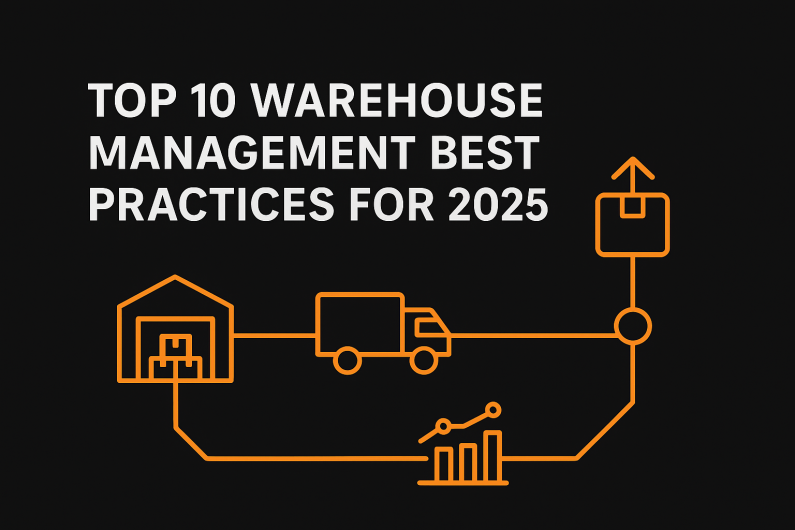Top 10 Warehouse Management Best Practices for 2025

Top 10 Warehouse Management Best Practices for 2025
Introduction: Why Warehouse Management Matters in 2025
Think about this: one small delay in your warehouse today can ripple through the entire supply chain tomorrow. In 2025, speed, accuracy, and sustainability aren’t just buzzwords—they are survival rules. Businesses that ignore warehouse best practices risk losing customers, money, and even their reputation. That’s why mastering warehouse management is no longer optional; it’s the heartbeat of every successful business.
Best Practice 1 – Prioritize Real-Time Inventory Tracking
Ever had that sinking feeling when a product is out of stock just when customers need it most? Real-time inventory tracking puts an end to those nightmares.
How real-time data prevents stockouts
By monitoring goods as they move in and out, you can avoid overstocks and shortages, keeping your customers satisfied.
Benefits of IoT and RFID in warehouses
With IoT sensors and RFID tags, you get 24/7 visibility into your stock levels, reducing costly guesswork.
Best Practice 2 – Implement Automation and Robotics
Automation is no longer the future—it’s today’s demand.
Reducing human error with smart automation
From robotic pickers to automated sorting systems, these tools eliminate costly mistakes while speeding up operations.
Balancing people and machines
The goal isn’t replacing people—it’s freeing them to focus on higher-value tasks while machines handle repetitive work.
Best Practice 3 – Optimize Warehouse Layout for Efficiency
A cluttered warehouse is a profit killer.
How poor design increases costs
Poor layouts waste time, fuel frustration, and inflate operational costs.
Tips for redesigning space smartly
Think vertical storage, clearly marked aisles, and easy-to-access high-demand items. Efficiency starts with design.
Best Practice 4 – Focus on Safety and Compliance
Warehouse accidents don’t just hurt people—they hurt businesses.
Protecting employees and goods
Regular safety checks, ergonomic equipment, and training create a culture of care.
Meeting regulatory standards in 2025
With new compliance rules, warehouses must keep up or risk heavy penalties.
Best Practice 5 – Strengthen Demand Forecasting
Forecasting is like predicting the weather—it’s not always perfect, but technology makes it better.
Using AI-driven analytics
AI crunches past data and market trends to predict demand spikes before they happen.
Linking forecasts with supply chain agility
Better forecasts mean quicker response times and happier customers.
Best Practice 6 – Leverage Sustainable Practices
Sustainability is not just a choice—it’s a responsibility.
Green warehousing as a competitive edge
Eco-friendly practices win customer trust and cut costs at the same time.
Energy-saving technologies
Solar panels, LED lighting, and smart cooling systems are reshaping warehouse operations.
Best Practice 7 – Enhance Supplier Collaboration
In 2025, isolated warehouses are a thing of the past.
Why supplier trust is critical
When suppliers and warehouses work hand in hand, stock delays and shortages shrink drastically.
Using digital platforms for visibility
Shared dashboards keep everyone updated—transparency builds trust.
Best Practice 8 – Adopt Advanced WMS (Warehouse Management Systems)
A warehouse without a proper WMS is like driving blindfolded.
Cloud-based WMS for scalability
No matter your business size, cloud-based WMS grows with you.
Integration with ERP and procurement systems
Connecting WMS with ERP and procurement services ensures a smooth flow from supplier to customer.
Best Practice 9 – Improve Last-Mile Delivery Coordination
Customers don’t care how good your warehouse is—they care about when they get their order.
Customer expectations in 2025
Same-day delivery isn’t a luxury anymore—it’s expected.
Role of AI in last-mile efficiency
AI helps route optimization, reducing costs while keeping customers smiling.
Best Practice 10 – Invest in Employee Training and Upskilling
Machines can’t replace human judgment, creativity, and care.
People as the backbone of warehouses
Your team is your biggest asset. Train them, value them, and they’ll power your growth.
Future-proofing workforce skills
Upskilling workers in tech, AI, and automation ensures they grow as your warehouse grows.
Burning Issues Warehouses Face in 2025
- Rising costs of labor and energy
- Increasing demand for same-day delivery
- Cybersecurity threats to digital warehouses
- Balancing automation with human workforce needs
The Role of Procurement in Warehouse Success
Warehouse efficiency is deeply tied to smart procurement. Partnering with trusted procurement services helps businesses secure materials on time, reduce risks, and keep supply chains moving without interruptions.
Conclusion: The Future Belongs to Smart Warehouses
2025 is not about running warehouses the old way—it’s about adapting to a smarter, greener, and faster future. By embracing these best practices, businesses can turn warehouses from cost centers into growth engines. Remember, in the supply chain world, your warehouse is your heartbeat—keep it strong, and your entire business thrives.